
Find Help
More Items From Ergsy search
-
Is motor neurone disease hereditary?
Relevance: 100%
-

What causes motor neurone disease?
Relevance: 77%
-
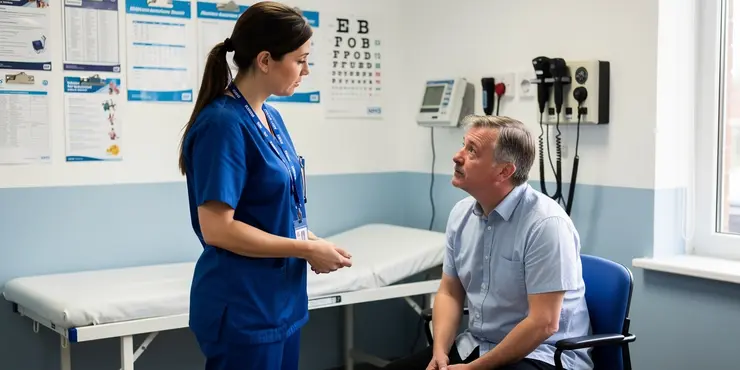
What is motor neurone disease?
Relevance: 74%
-
Are there different types of motor neurone disease?
Relevance: 69%
-
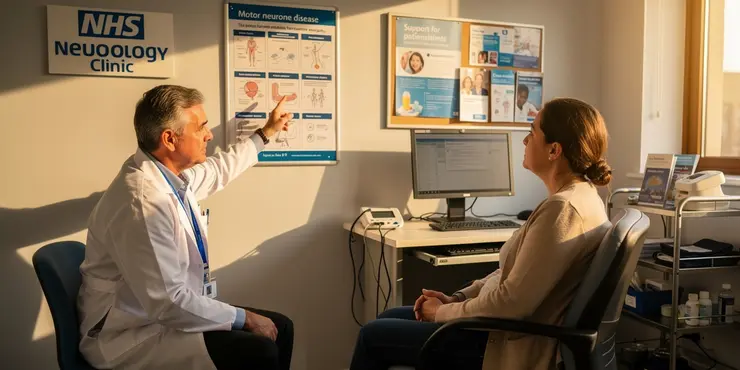
Is there a cure for motor neurone disease?
Relevance: 69%
-
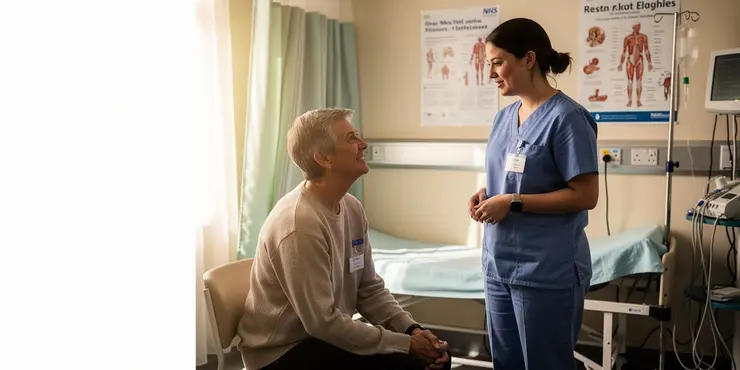
What are the primary symptoms of motor neurone disease?
Relevance: 64%
-

How is motor neurone disease diagnosed?
Relevance: 62%
-

What treatments are available for motor neurone disease?
Relevance: 62%
-
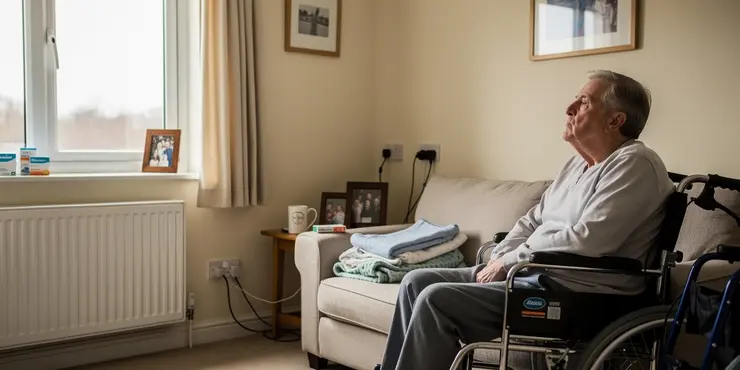
How is breathing affected by motor neurone disease?
Relevance: 61%
-
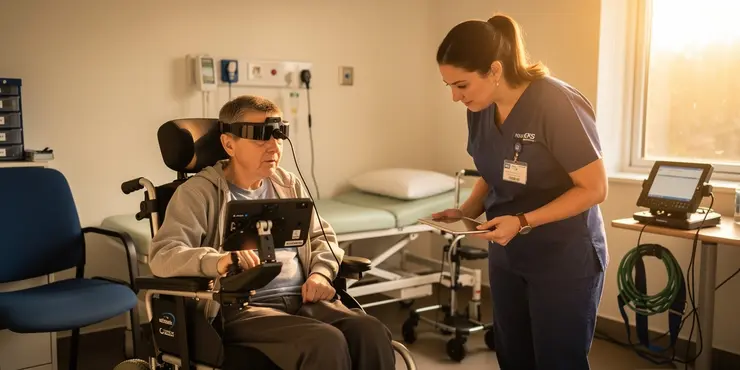
What assistive devices can help people with motor neurone disease?
Relevance: 61%
-

What role do genetics play in motor neurone disease?
Relevance: 60%
-

Motor neurone disease Julie's story | NHS
Relevance: 59%
-
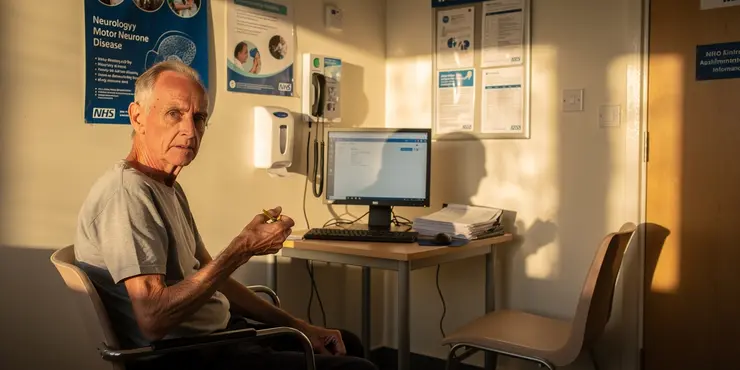
How does motor neurone disease affect the body?
Relevance: 57%
-
How does motor neurone disease affect speech?
Relevance: 57%
-
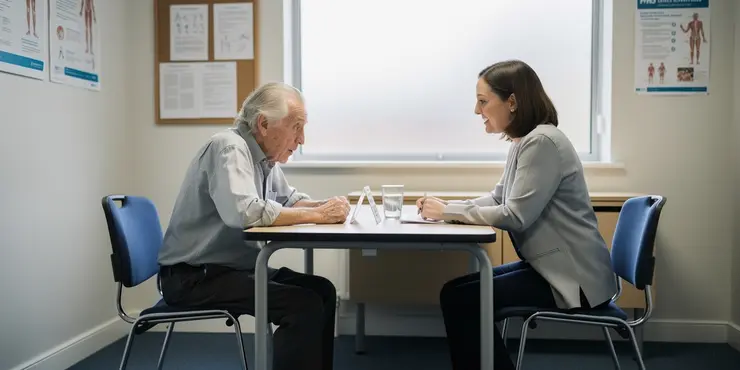
How does motor neurone disease impact swallowing?
Relevance: 55%
-
Can lifestyle changes impact motor neurone disease progression?
Relevance: 54%
-
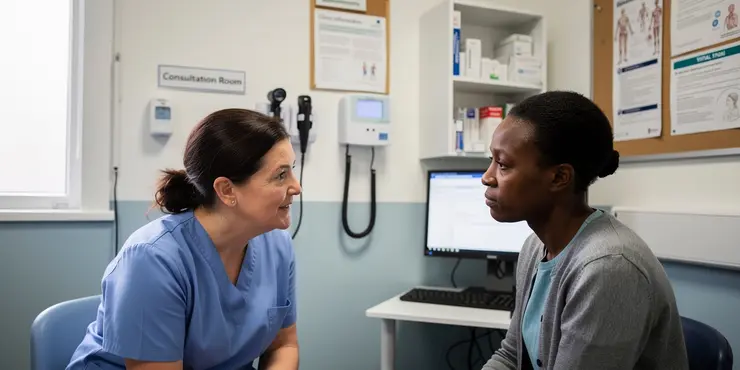
What is the life expectancy after a motor neurone disease diagnosis?
Relevance: 53%
-

Voice banking service helps people live with motor neurone disease
Relevance: 53%
-

How can caregivers support someone with motor neurone disease?
Relevance: 50%
-

Are there support groups for individuals with motor neurone disease?
Relevance: 46%
-
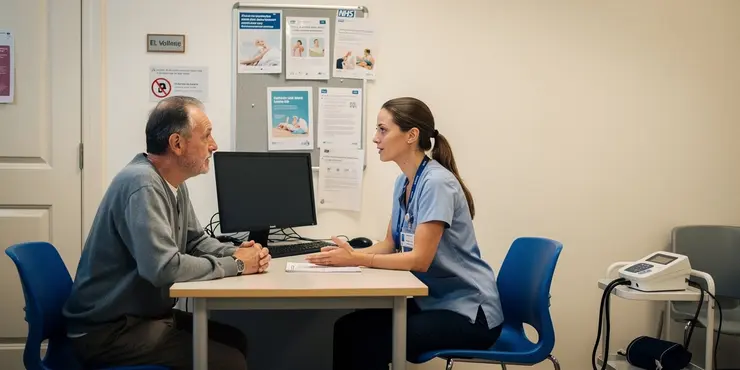
Who is at risk for motor neurone disease?
Relevance: 45%
-
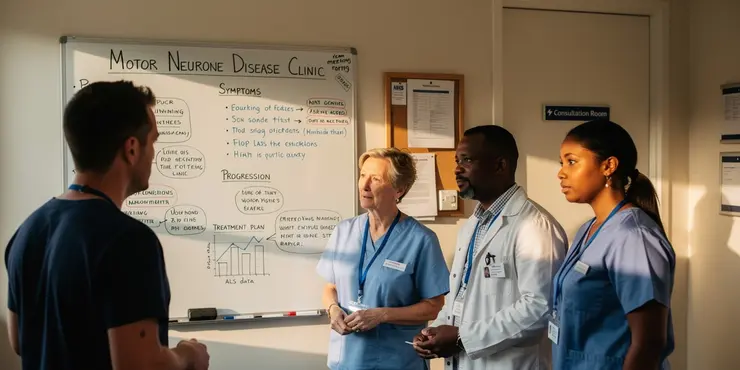
What research is being done on motor neurone disease?
Relevance: 45%
-
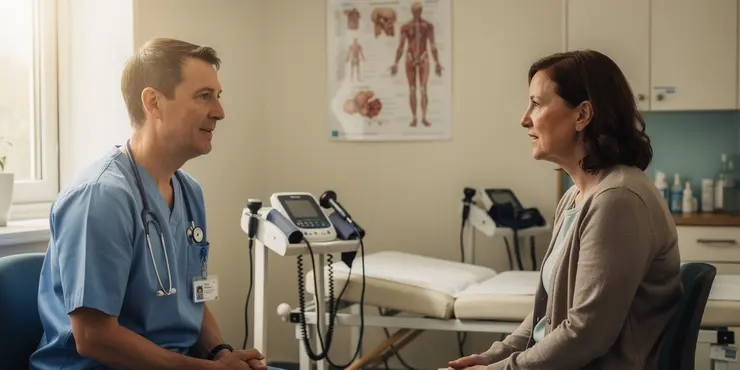
Is appendicitis hereditary?
Relevance: 33%
-
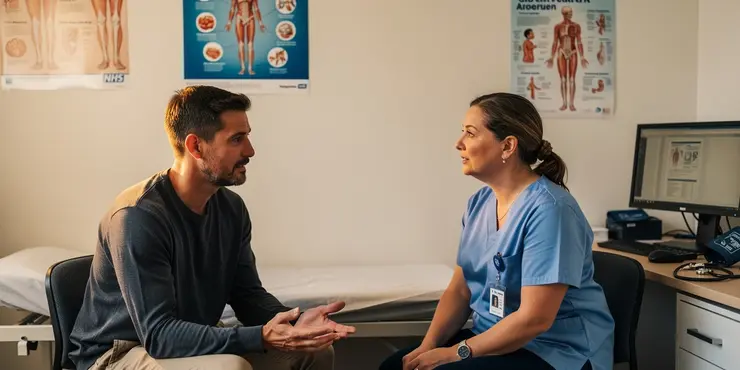
What causes Huntington's disease?
Relevance: 33%
-

What is MND?
Relevance: 33%
-
How does Huntington's disease affect movement?
Relevance: 29%
-
What is Parkinson's disease?
Relevance: 27%
-

Is Type 2 Diabetes hereditary?
Relevance: 26%
-

Is high blood pressure hereditary?
Relevance: 25%
-
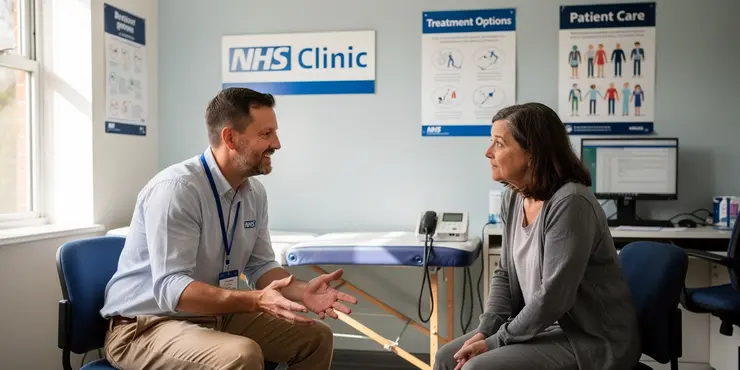
What research is being done on Huntington's disease?
Relevance: 24%
-
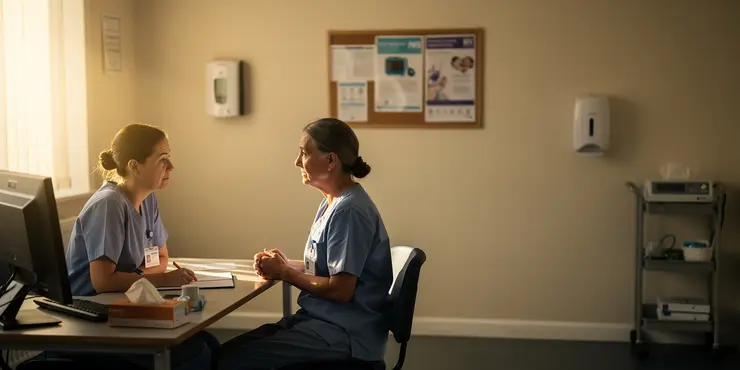
Can Huntington's disease be cured?
Relevance: 23%
-

What causes Alzheimer's disease?
Relevance: 23%
-
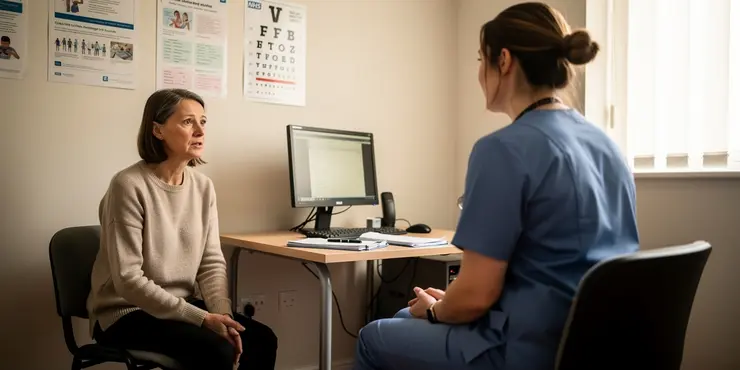
What are the symptoms of Huntington's disease?
Relevance: 23%
-

Is Huntington's disease fatal?
Relevance: 22%
-
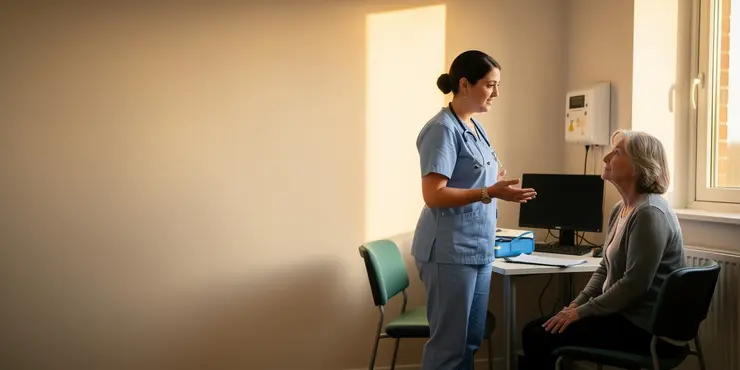
What causes Crohn's disease?
Relevance: 21%
-
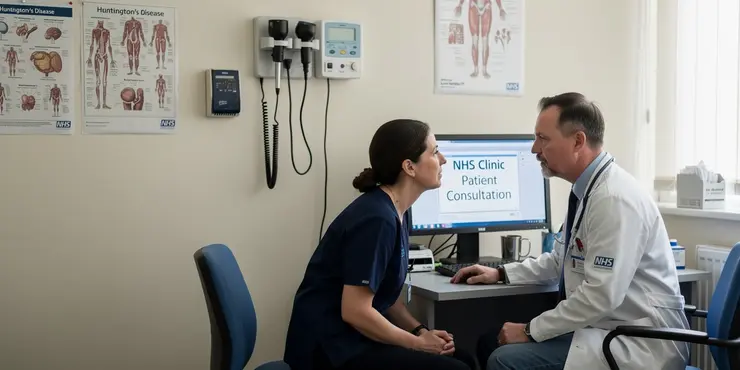
How does Huntington's disease affect cognition?
Relevance: 21%
-
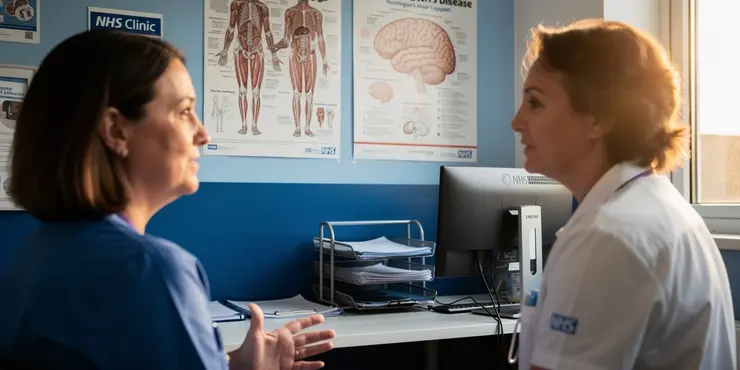
What is Huntington's disease?
Relevance: 19%
-

Can Huntington's disease be prevented?
Relevance: 19%
-

Is bowel cancer hereditary?
Relevance: 18%
-
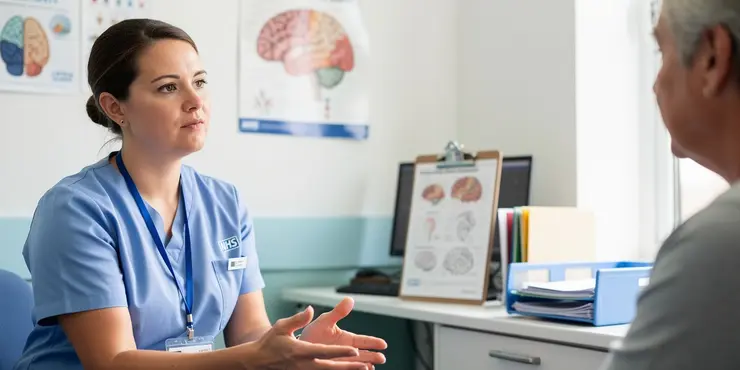
An introduction to frontotemporal dementia (FTD) (part 1/3)
Relevance: 18%
Understanding Motor Neurone Disease
Motor neurone disease (MND) is a progressive neurological condition that affects the motor neurones, the cells responsible for controlling voluntary muscles. This debilitating disease leads to weakness and wasting of muscles, impacting everyday activities such as walking, speaking, and breathing. As MND progresses, it severely affects individuals' quality of life.
The Hereditary Aspect of MND
One of the crucial questions surrounding motor neurone disease is its hereditary nature. In a significant number of cases, MND occurs sporadically, meaning there is no apparent family history of the disease. However, research indicates that approximately 5-10% of cases are familial, where the condition is inherited in families.
Familial MND is often attributed to specific genetic mutations that are passed down from one generation to the next. Some of the most common genetic mutations associated with familial MND include those in the SOD1, C9orf72, TARDBP, and FUS genes. These mutations are known to disrupt normal cellular processes, ultimately leading to the characteristic neurodegeneration observed in MND.
Genetic Testing and Diagnosis
For individuals with a family history of MND, genetic testing can provide valuable insights into the likelihood of inheriting the disease. Genetic counselling is often recommended to help individuals understand the risks and implications of carrying specific mutations. It's important to note that even if a person has a genetic mutation linked to MND, it does not guarantee that they will develop the disease.
Healthcare professionals in the UK often use genetic testing as part of a comprehensive diagnostic process, particularly for families with a history of MND. Early diagnosis can be beneficial for managing symptoms and planning for future care needs.
Implications and Support in the UK
For those diagnosed with MND, whether sporadic or familial, the impact can be profound. In the UK, organisations such as the Motor Neurone Disease Association provide crucial support, offering resources and advice to individuals, families, and carers. These organisations also play an essential role in funding research to better understand the disease's genetic basis and find potential therapies.
While significant progress has been made in understanding the genetic factors related to MND, much remains to be discovered. Ongoing research aims to explore the complex interactions between genetic, environmental, and lifestyle factors that may contribute to the onset and progression of the disease.
Conclusion
In conclusion, while motor neurone disease is primarily sporadic, a small but significant proportion of cases are hereditary. For those with a family history of MND, understanding the genetic elements involved is crucial for informed decision-making. As research progresses, there is hope for improved diagnostics and treatments that target the genetic underpinnings of this challenging condition.
What is Motor Neurone Disease?
Motor neurone disease (MND) is a disease that damages nerves called motor neurones. These nerves help muscles move. MND makes muscles weak, which can make walking, talking, and breathing hard. As time goes on, MND can make life very difficult.
Is MND Inherited?
Some people wonder if MND runs in families. Most of the time, MND happens by chance, and no one else in the family has it. But in about 5-10% of cases, MND is inherited, meaning it runs in families.
When MND is inherited, it usually happens because of changes in certain genes. These genes, like SOD1, C9orf72, TARDBP, and FUS, do not work properly, which can lead to MND.
Testing for Genes and Diagnosis
If someone in your family has MND, you can have a genetic test to see if you might get it too. A genetic counselor can help you understand what the test results mean. Just because you have the gene change doesn't mean you will definitely get MND.
In the UK, doctors use genetic tests to help find out if someone has MND, especially if it runs in the family. Finding out early can help people manage the disease better.
Support in the UK
Having MND can be very hard. In the UK, groups like the Motor Neurone Disease Association help people with MND and their families. They give advice and support and fund research to learn more about MND.
Scientists are still learning about MND. They want to find out how genes, the environment, and lifestyle might lead to MND.
Conclusion
In summary, most MND cases happen by chance, but some are inherited. If MND is in your family, understanding the genes involved is important. Scientists are working hard to find better ways to diagnose and treat MND.
Frequently Asked Questions
What is motor neurone disease?
Motor neurone disease (MND) is a degenerative disorder that affects the nerve cells (neurons) responsible for controlling voluntary muscles.
Is motor neurone disease hereditary?
In about 5-10% of cases, motor neurone disease is hereditary, often referred to as familial MND. The majority of cases are sporadic with no known family history.
What genes are associated with hereditary motor neurone disease?
Mutations in several genes have been linked to hereditary MND, including SOD1, C9orf72, TARDBP, and FUS.
How is hereditary motor neurone disease inherited?
Hereditary MND is usually inherited in an autosomal dominant pattern, meaning a mutation in just one copy of the gene can cause the disease.
Can genetic testing determine if I am at risk for hereditary motor neurone disease?
Yes, genetic testing can identify mutations associated with hereditary MND, particularly if there is a known family history of the disease.
Does having a family member with MND mean I will get it too?
Not necessarily. Even in familial cases, the inheritance pattern and risk can vary, and genetic counseling can help assess personal risk.
What percentage of motor neurone disease cases are familial?
Approximately 5-10% of MND cases are considered familial, where a genetic mutation is passed down from one generation to the next.
If I have a parent with hereditary MND, what are the chances I will inherit the condition?
If MND is inherited in an autosomal dominant manner, there is a 50% chance of inheriting the mutation from an affected parent.
Are there any preventive measures for hereditary motor neurone disease?
Currently, there are no known preventive measures for hereditary MND, but genetic counseling can provide information on risks and family planning options.
Is there a cure for motor neurone disease?
There is no cure for motor neurone disease, but treatments can help manage symptoms and improve quality of life.
What is the difference between familial and sporadic MND?
Familial MND is inherited and accounts for about 5-10% of cases, while sporadic MND occurs in individuals without a family history of the disease.
What role does the C9orf72 gene play in hereditary MND?
The C9orf72 gene is the most common genetic cause of familial MND in Western populations, often involving a specific type of mutation called a repeat expansion.
Can lifestyle factors influence the development of hereditary MND?
While lifestyle factors play a larger role in sporadic cases, the development of hereditary MND is primarily genetic, though environment may also have some influence.
What symptoms are associated with motor neurone disease?
Symptoms of MND can include muscle weakness, twitching, stiffer muscles, and difficulty with speech, swallowing, and breathing.
What is the life expectancy of someone with motor neurone disease?
Life expectancy varies but is typically 2 to 5 years after diagnosis, although some individuals live longer.
How is motor neurone disease diagnosed?
Diagnosis involves clinical examination, electromyography (EMG), nerve conduction studies, and ruling out other conditions. Genetic testing may be used in familial cases.
Are there any known risk factors for sporadic motor neurone disease?
Potential risk factors for sporadic MND include age, gender, smoking, and exposure to toxins, though the precise causes are not fully understood.
Can children inherit motor neurone disease from both parents?
This is unlikely for most hereditary MND forms, as they follow an autosomal dominant pattern. However, rare forms may involve recessive inheritance, necessitating two mutated copies of a gene.
Why is genetic counseling important for families affected by MND?
Genetic counseling provides information on the risk of inheritance, helps with understanding genetic test results, and aids in making informed family planning decisions.
What current research is being conducted on hereditary motor neurone disease?
Research focuses on understanding genetic mutations, developing therapies to target these mutations, and exploring ways to slow disease progression.
What is motor neurone disease?
Motor neurone disease is an illness. It changes how the nerves in your body work. These nerves help your muscles move.
If someone has this disease, their muscles get weak. It can be hard to walk, talk, or even breathe.
If you want to learn more or need help, you can talk to a doctor or nurse. They can answer questions and give support.
Using pictures or videos can also help to understand better.
Motor neurone disease or MND is a sickness that makes certain nerve cells stop working well. These nerves help control the muscles that move when you want them to, like when you walk or pick things up.
Can you get motor neurone disease from your family?
Sometimes people can get motor neurone disease because it runs in their family. This means someone in their family also had it. But, not everyone who gets this disease has a family member who had it too. So, it can happen both ways.
If you're worried, you can talk to a doctor. They can help and give you more information.
Sometimes, motor neurone disease (or MND) can run in families. This happens in about 5-10% of cases. We call this familial MND. Most of the time, MND doesn’t run in families and happens without anyone in the family having it before. This is called sporadic MND.
What genes are linked to motor neurone disease that you get from family?
Changes in some genes can cause MND to run in families. These genes are called SOD1, C9orf72, TARDBP, and FUS.
If reading is difficult, try using tools that read text out loud for you.
How do you get hereditary motor neurone disease?
Hereditary motor neurone disease is passed down from parents. This means it runs in families.
If someone in your family has the disease, you might get it too.
You can ask a doctor for a special test to find out if you have it.
Using pictures and simple charts can help you understand this better.
Hereditary MND is passed down from parents to children. It is caused by a change in one gene.
Can a DNA test show if I might get a motor neurone disease that runs in families?
Yes, a DNA test can help. It looks at your genes to see if you might get a disease that can be passed down from parents to children.
If you think this might be useful, talk to a doctor. They can explain how the test works.
Talking to a genetic counselor can also be helpful. They will help you understand what the test results mean.
Yes, a special test can find changes in genes that might cause MND. This is more likely if other people in your family have had the illness.
If someone in my family has MND, will I get it too?
MND stands for Motor Neurone Disease. It is a serious illness that affects nerves in the body.
Having a family member with MND does not always mean you will get it too.
Most people do not get it even if someone in their family has it.
If you are worried, you can talk to a doctor or nurse. They can give you advice and information.
It can be helpful to write down your questions before you speak to them.
You can also bring a friend or family member with you when you talk to the doctor.
No, not always. Even if a disease runs in the family, it can be different for each person. Talking to a genetic counselor can help you understand your own risk.
How many people with motor neurone disease got it from their family?
Motor neurone disease (MND) is a sickness that hurts the nerves in the body. Some people get it because their family members had it too. This is called "familial." We can find out how many people got it from their family by using "percentages."
Ask someone to explain percentages to you. They can help with easy number examples.
You can also use some tools to help you understand, like:
- Videos about percentages for kids
- Books with pictures
- Talking to a doctor or a teacher
About 5 to 10 out of every 100 people with MND have it because of their family. This means it is passed down from parents to children because of a change in their genes.
If my parent has MND, will I get it too?
MND stands for Motor Neurone Disease. It can run in families, which is called hereditary.
If your mom or dad has hereditary MND, you might wonder if you will get it too.
Here are some things to know:
- You might inherit MND, but not always. Your chances depend on many things.
- It's good to talk to a doctor for advice. They can explain more and help you.
- You can also ask your doctor about genetic testing. This test can tell more about your chances.
Talking to someone who understands MND can help you feel better.
If MND (Motor Neurone Disease) runs in families, and it's passed down in a special way called "autosomal dominant," there's a 50/50 chance you might get it from a parent who has it.
Can we stop motor neurone disease if it's in the family?
Doctors have not found a sure way to stop motor neurone disease if it runs in families. But there are things that can help:
- Visit a doctor to learn more about the disease.
- Talk to a genetic counselor. They can tell you if it might run in your family.
- Join a support group to share and learn from others.
These steps can help you learn more and feel supported.
Right now, there is no way to stop people from getting hereditary MND. But talking to a genetic counselor can help. They can tell you about the risks and help with family planning.
Can doctors make motor neurone disease go away?
There is no cure for motor neurone disease right now. This means doctors cannot make it go away. But there is good news. Doctors can give medicine to help with some problems. This medicine can help people feel better and live longer. It is also helpful to talk to a doctor or nurse. They can give advice about how to make everyday tasks easier.
Technology can help too. Some people use special computers or phones. These can help with talking and writing. It's important to ask for help if you need it.
There is no way to make motor neurone disease go away, but doctors can give you treatments to help with the symptoms and make your life better.
How are familial MND and sporadic MND different?
MND is short for Motor Neuron Disease. Some people get MND because it runs in their family. This is called familial MND.
Other people get MND even though no one else in their family has ever had it. This is called sporadic MND.
If you want to know more, you can:
- Look for pictures or videos that explain MND.
- Ask a doctor or nurse to help you understand.
- Use tools that read text out loud to you.
Some people get MND from their family. This happens in about 5 to 10 out of every 100 cases. This is called familial MND.
Other people get MND even though no one else in their family has it. This is called sporadic MND.
It can be helpful to talk with a doctor if you have questions. They can explain more about MND.
What does the C9orf72 gene do in family MND?
The C9orf72 gene can affect the brain.
If this gene changes, it may cause a sickness called MND that runs in families.
It is important to understand this gene to help people with this sickness.
Using pictures or talking with a helper can make learning about this easier.
The C9orf72 gene is a part of our body that can cause MND, a serious illness, in families. This happens a lot in Western countries. It is caused by a special change in the gene called a "repeat expansion."
Can the way you live affect hereditary MND?
MND stands for Motor Neurone Disease. Hereditary means it runs in families.
This question is asking if the choices you make every day can affect the disease.
Some things you do, like eating well and exercising, might help keep you healthy. But it's best to talk to a doctor for advice.
Using pictures, videos, or apps can help you understand more about MND and make learning easier.
Hereditary MND happens mostly because of genes. But what you do every day and your surroundings can also have a small effect.
For reading help, you can try using audiobooks or text-to-speech tools to listen to the text while reading along.
What signs show someone might have motor neurone disease?
Motor neurone disease is a sickness that affects the nerves in the body. Here are some signs to look out for:
- Weak muscles – Your muscles might feel tired and weak.
- Hard to move – It might be difficult to walk or move around.
- Muscle twitching – Your muscles might jump or twitch a lot.
- Problems speaking – Talking might become hard or unclear.
- Trouble swallowing – It might be hard to eat or drink.
If you think you or someone else has these signs, talk to a doctor.
For extra help reading or understanding, use pictures or ask someone to explain.
MND can make muscles weak. You might see muscles twitching (little jerks). Muscles can feel stiff. It can also be hard to talk, swallow, or breathe.
How long do people live with motor neurone disease?
Most people live for 2 to 5 years after they find out they have the illness. But some people live longer.
How do doctors find out if someone has motor neurone disease?
Finding out what's wrong can be done by doctors using a few ways:
- Check-up: The doctor looks at your body and asks questions.
- EMG Test: A special test to see how your muscles work.
- Nerve Test: This checks how well your nerves send messages.
- Look for Other Problems: The doctor makes sure it's not something else causing the issue.
- Family Test: If others in your family have the same problem, they might test your genes.
Tools like picture charts and simple videos can help understand more.
What can make someone more likely to get motor neurone disease?
There are some things that might make someone more likely to get MND (Motor Neurone Disease), but we don't know for sure what causes it. These things are:
- How old you are.
- Whether you are a boy or a girl.
- If you smoke.
- If you have been around harmful chemicals.
It can help to talk to your doctor if you are worried. They can give you good advice. Using apps or reading guides with pictures can also help you understand better.
Can kids get motor neurone disease from both their mom and dad?
Motor neurone disease is an illness that affects nerves in the brain and spine, which help muscles work. Here’s a simple way to understand if kids can get it: - Sometimes, this illness is in families. This means it can be passed from parents to kids. - If both mom and dad have it, there is a bigger chance their kids might have it too. - But not all kids will get the illness, even if both parents have it. If you want to know more or need help understanding, here are some things you can do: - Ask a doctor or nurse to explain. - Use drawings or pictures to help understand. - Talk with someone who knows a lot about the illness.This usually does not happen for most kinds of family-related MND. This is because they are passed down in a way called 'autosomal dominant.' But, there are some rare kinds of MND. For these, the way it is passed down is called 'recessive inheritance.' This means you need two changed copies of a gene to have the condition.
Why is genetic counseling important for families with MND?
Genetic counseling is a time when you talk to a special doctor about DNA and families. It is important for families with Motor Neuron Disease (MND) because:
- It helps families understand what MND is.
- It explains how MND can run in families.
- It helps people know if they might get MND.
- It answers questions about having children and passing on MND.
If reading is hard, you can ask someone you trust to read this with you. Using pictures and videos can also help you understand better.
Genetic counseling helps people learn about genes and their family health. It explains how genes can affect family health and helps people understand test results. This can help families make smart choices about having children.
What are scientists studying about inherited motor neuron disease?
Scientists are doing studies to learn more about inherited motor neuron disease. They want to find out how it starts and how to help people with it. Inherited means the disease can be passed from parents to children.
Scientists look at genes, which are like little instructions inside our bodies, to see how they are linked to the disease.
Some tools to help understand this are:
- Pictures and diagrams that show how genes work.
- Videos that explain what scientists are doing.
If you want to know more, you can ask a teacher, family member, or a friend to help explain it to you.
Scientists are studying tiny changes in our genes. They want to find new medicines to fix these changes. They also look for ways to slow down sickness.
Useful Links
This website offers general information and is not a substitute for professional advice.
Always seek guidance from qualified professionals.
If you have any medical concerns or need urgent help, contact a healthcare professional or emergency services immediately.
Some of this content was generated with AI assistance. We’ve done our best to keep it accurate, helpful, and human-friendly.
- Ergsy carfully checks the information in the videos we provide here.
- Videos shown by Youtube after a video has completed, have NOT been reviewed by ERGSY.
- To view, click the arrow in centre of video.
- Most of the videos you find here will have subtitles and/or closed captions available.
- You may need to turn these on, and choose your preferred language.
- Go to the video you'd like to watch.
- If closed captions (CC) are available, settings will be visible on the bottom right of the video player.
- To turn on Captions, click settings .
- To turn off Captions, click settings again.
More Items From Ergsy search
-
Is motor neurone disease hereditary?
Relevance: 100%
-

What causes motor neurone disease?
Relevance: 77%
-

What is motor neurone disease?
Relevance: 74%
-
Are there different types of motor neurone disease?
Relevance: 69%
-

Is there a cure for motor neurone disease?
Relevance: 69%
-

What are the primary symptoms of motor neurone disease?
Relevance: 64%
-

How is motor neurone disease diagnosed?
Relevance: 62%
-

What treatments are available for motor neurone disease?
Relevance: 62%
-

How is breathing affected by motor neurone disease?
Relevance: 61%
-

What assistive devices can help people with motor neurone disease?
Relevance: 61%
-

What role do genetics play in motor neurone disease?
Relevance: 60%
-

Motor neurone disease Julie's story | NHS
Relevance: 59%
-

How does motor neurone disease affect the body?
Relevance: 57%
-
How does motor neurone disease affect speech?
Relevance: 57%
-

How does motor neurone disease impact swallowing?
Relevance: 55%
-
Can lifestyle changes impact motor neurone disease progression?
Relevance: 54%
-

What is the life expectancy after a motor neurone disease diagnosis?
Relevance: 53%
-

Voice banking service helps people live with motor neurone disease
Relevance: 53%
-

How can caregivers support someone with motor neurone disease?
Relevance: 50%
-

Are there support groups for individuals with motor neurone disease?
Relevance: 46%
-

Who is at risk for motor neurone disease?
Relevance: 45%
-

What research is being done on motor neurone disease?
Relevance: 45%
-

Is appendicitis hereditary?
Relevance: 33%
-

What causes Huntington's disease?
Relevance: 33%
-

What is MND?
Relevance: 33%
-
How does Huntington's disease affect movement?
Relevance: 29%
-
What is Parkinson's disease?
Relevance: 27%
-

Is Type 2 Diabetes hereditary?
Relevance: 26%
-

Is high blood pressure hereditary?
Relevance: 25%
-

What research is being done on Huntington's disease?
Relevance: 24%
-

Can Huntington's disease be cured?
Relevance: 23%
-

What causes Alzheimer's disease?
Relevance: 23%
-

What are the symptoms of Huntington's disease?
Relevance: 23%
-

Is Huntington's disease fatal?
Relevance: 22%
-

What causes Crohn's disease?
Relevance: 21%
-

How does Huntington's disease affect cognition?
Relevance: 21%
-

What is Huntington's disease?
Relevance: 19%
-

Can Huntington's disease be prevented?
Relevance: 19%
-

Is bowel cancer hereditary?
Relevance: 18%
-

An introduction to frontotemporal dementia (FTD) (part 1/3)
Relevance: 18%


